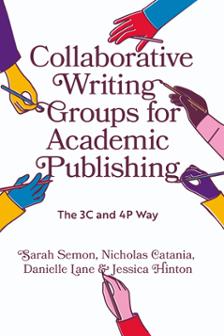
References
Collaborative Writing Groups for Academic Publishing
ISBN: 978-1-83753-005-2, eISBN: 978-1-83753-004-5
Publication date: 10 July 2024
Citation
Semon, S., Catania, N., Lane, D. and Hinton, J. (2024), "References", Collaborative Writing Groups for Academic Publishing, Emerald Publishing Limited, Leeds, pp. 119-120. https://doi.org/10.1108/978-1-83753-004-520241010
Publisher
:Emerald Publishing Limited
Copyright © 2024 Sarah Semon, Nicholas Catania, Danielle Lane and Jessica Hinton. Published under exclusive licence by Emerald Publishing Limited
Akpan, 2020 Akpan, B. (2020). Classical and operant conditioning—Ivan Pavlov; Burrhus Skinner. In Science education in theory and practice: An introductory guide to learning theory (pp. 71–84).
Bryce, 2021 Bryce, N. (2021). A year in a faculty writing group: Equity for women academics in higher education. The Journal of Faculty Development, 35(1), 70–75.
Commitment, n, 2023 “Commitment, n” . (2023, September). OED online. Oxford University Press. Accessed on 10 July 2023.
Fiore and Koverola, 2022 Fiore, L. , & Koverola, C. (2022). Building trust between faculty and administrators: An intercultural perspective (1st ed.). Routledge.
Fitzgerald et al., 2020 Fitzgerald, S. , Budd, J. , Beile, P. , & Kaspar, W. (2020). Modeling transparency in roles: Moving from authorship to contributorship. College and Research Libraries, 81(7), 1056. https://doi.org/10.5860/crl.81.7.1056
Gallardo-Williams et al., 2021 Gallardo-Williams, M. , Parks, L. D. , & Carson, S. (2021). Creation of a cohort of educational research practitioners: The TH!NK researchers program. The Journal of Faculty Development, 35(2), 10–19.
Haviland et al., 2020 Haviland, D. , Alleman, N. F. , Cliburn, A. C. , & Jacobs, J. (2020). Inclusive collegiality and nontenure-track faculty: Engaging all faculty as colleagues to promote healthy departments and institutions. Stylus Publishing, LLC.
Imposter syndrome, n, 2018 “Imposter syndrome, n” . (2018, June). OED online. Oxford University Press. Accessed on 10 October 2023.
KanbanTool, KanbanTool . (n.d.). Kanban history. KanbanTool. https://kanbantool.com/kanban-guide/kanban-history. Accessed on 27 December 2023.
Kour et al., 2019 Kour, J. , El-Den, J. , & Sriratanaviriyakul, N. (2019). The role of positive psychology in improving employees' performance and organizational productivity: An experimental study. Procedia Computer Science, 161, 226–232. https://doi.org/10.1016/j.procs.2019.11.118
Lencioni, 2005 Lencioni, P. (2005). The five dysfunctions of a team: A leadership fable. Jossey-Bass.
Likert, 1967 Likert, R. (1967). The human organization: Its management and values. McGraw-Hill.
Peñalver et al., 2019 Peñalver, J. , Salanova, M. , Martínez, I. M. , & Schaufeli, W. B. (2019). Happy-productive groups: How positive affect links to performance through social resources. The Journal of Positive Psychology, 14(3), 377–392.
Pfeifer, 2022 Pfeifer, H. (2022). Combatting misinformation and the assault on academic freedom with research, education, and advocacy. Justice Quarterly, 39(5), 897–922. https://doi.org/10.1080/07418825.2022.2086482
Schimel, 2022 Schimel, J. (2022). Your future as a faculty member how to survive and thrive in academia (1st ed.). Oxford University Press.
Schreiber, 2008 Schreiber, M. (2008). An empirical investigation of the g-index for 26 physicists in comparison with the h-index, the A-index, and the R-index. Journal of the American Society for Information Science and Technology, 59(9), 1513–1522. https://doi.org/10.1002/asi.20856
Tuckman, B. W. (1965) Tuckman, B. W. (1965). Developmental sequence in small groups. Psychological Bulletin, 63(6), 384–399. https://doi.org/10.1037/h0022100
Uddin et al., 2019 Uddin, S. , Choudhury, N. , & Hossain, M. E. (2019). A research framework to explore knowledge evolution and scholarly quantification of collaborative research. Scientometrics, 119(2), 789–803. https://doi.org/10.1007/s11192-019-03057-4
- Prelims
- Chapter 1 Introduction
- Chapter 2 The Complex Context of Scholarship
- Chapter 3 The 3Cs: Common Focus, Commitment, and Communication
- Chapter 4 The 4Ps: Priorities, Plans, Protecting Deadlines, and Positive Reinforcement
- Chapter 5 The Soft Side: Attending to Relationships
- Chapter 6 Analog and Digital Tools, Pitfalls, and Best Practices
- Chapter 7 The Path to Publication
- Chapter 8 Final Thoughts
- References